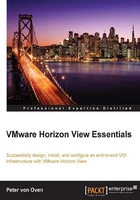
What this book covers
Chapter 1, Introducing VDI and VMware Horizon 6.0, introduces what VDI is and how it compares with other VDI-type technologies. We will then cover the VMware VDI story and history in brief, followed by an overview of the latest solution.
Chapter 2, Horizon View 6.0 Architectural and Feature Overview, introduces you to the different components that make up the Horizon View solution. Each section will start with an overview of a specific feature or component, describing its role in the overall solution, how it fits into the infrastructure, and in some cases, take a look under the hood at how it works.
Chapter 3, Designing and Building a Horizon View 6.0 Infrastructure, starts by talking about where to start and how to run a successful pilot. Before we embark on our VDI project, we need to understand how to approach it. We then go on to look at how we design and size an environment using a real-life example scenario.
Chapter 4, Installing Horizon View 6.0, shows you how to install the Horizon View components. Each section of the installations will be shown in detail using screenshots, detailing each of the options we select and providing reasons as to why we are selecting them. You also have the opportunity to follow the installation process, as we also build out an example lab.
Chapter 5, A Guided Tour of the Horizon View Administrator Console, takes a quick guided tour of the View Administrator console. The Horizon View Administrator is a web-based management console that is used to manage your View environment, allowing you to configure infrastructure components, desktop pools, and user entitlements.
Chapter 6, Building and Optimizing Virtual Desktop Machine OS Images, looks at how to build an operating system image for use as a virtual desktop machine. We will cover the step-by-step process of building the virtual machine, optimizing it for VDI, and then preparing it for delivery to the end user. Using examples, we will build a Windows 7 virtual desktop using linked clones, a Windows 8 full-clone desktop, and a Windows 7 full-clone desktop with access to a hardware-enabled GPU.
Chapter 7, Configuring Horizon View to Deliver Virtual Desktops, follows on from the previous chapter and we will now configure and prepare Horizon View to deliver the virtual desktop machines we built in that chapter. Using the example lab, we will configure three desktop pools for our three virtual desktop machines, one for Windows 7 (a floating assignment with linked clones), one for Windows 8 (a dedicated, full clone), and finally, a manual pool with a dedicated assignment and using an NVIDIA GPU.
Chapter 8, Horizon View Clients, looks at the different options available to end users in order to allow them to connect to their virtual desktop machines, some of the advantages and disadvantages of the different options, and why it matters which one you choose. We will talk about software clients, hardware clients, thin clients, and accessing your desktop from a browser.
Chapter 9, Fine-tuning the End User Experience, covers how we can fine-tune the end user experience. With users now using virtual desktop machines, we need to make sure that the end user experience is running at its optimum level. In this chapter, we will look at how we can tune this experience, firstly with the Active Directory Group Policy templates that control the behavior of the virtual desktop machine, and then with some of the other tools that are available.
Appendix, References, contains useful links related to the official VMware documentation and tools covered in this book.